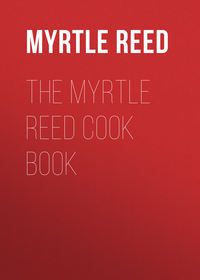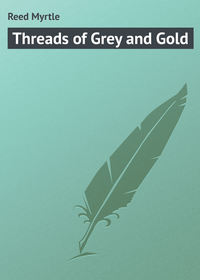 полная версия
полная версияThe White Shield

Myrtle Reed
The White Shield
Preface
The editor takes great pleasure in being able to give to the public another volume from the pen of the lamented author – Myrtle Reed. These fascinating bits of fiction reflect the characteristics of the writer; the same vivid imagination, the quick transition from pathos to humour, the facility of utterance, the wholesome sentiment, the purity of thought, the delicacy of touch, the spontaneous wit which endeared her to friends and to thousands of readers, not only in Europe and America, but also in Australia and South Africa, are here fully represented.
Her mission was largely one of comfort to the suffering and the sorrowing; letters of good cheer went to far-away countries where her personal ministry could reach in no other way, and her writings are rich with sympathy and hope which have poured the oil of gladness into many a wounded spirit.
Pathos is not sadness, but it is rather the sunshine gleaming through a passing cloud, and hence the writings of Myrtle Reed are illumined with the gladsome light of unfailing love. Not only in her books and in letters to troubled souls, but also in her personal records, we find the unfading lines of a deeply devotional nature which was sacredly guarded from the careless observer and seldom discussed even with friends. But in this abiding faith was rooted the brave loyalty and high purpose which not only characterised herself, but also all of her productions.
The beautiful stories here presented have given pleasure to thousands of readers in the magazines in which they first came into print, and it is to the unvarying courtesy of the publishers that we are indebted for the privilege of thus binding the scattered grain into a single golden sheaf.
For the many letters of sincere sympathy which, in response to a formal request, have come from these stranger-friends, the editor is especially grateful.
Elizabeth A. Reed.Chicago, February, 1912.
The White Shield
People said that Joe Hayward's pictures "lacked something." Even the critics, who know everything, were at a loss to find where the deficiency might be. Hayward, himself, worked hard studying the masters, patiently correcting faults in colour and perspective, and succeeding after a fashion. But he felt that art, in its highest and best sense, was utterly beyond him; there was a haunting elusive something which was continually beyond his reach.
Occasionally, when he sold a picture, he would give "a time" to a dozen artist chums from studios near by, as they did, whenever fortune favoured them; after this he would paint again, on and on, with a really tremendous perseverance.
At length, he obtained permission to make an exhibition of his work in a single room at the Art Gallery. The pictures were only ten in number, and some of them were small, but they represented a year's hard work. When he superintended the hanging, on Saturday morning, he was more nearly happy than he had ever been in his life. The placard on the door, "The Hayward Exhibition will open Monday," filled him with pleasure. It was not a conceited feeling of importance, but rather a happy consciousness that he had done his best.
At last he was suited with the arrangement. The men went out with the ladder and wire, and he stood in the centre of the room, contemplating the result. The landscape in the corner might be a little out of drawing, he thought, but the general public would not notice that. And the woman in white, beside it, which he had christened Purity certainly showed to good advantage. He remembered very well the day he had put the finishing touches upon it after the night of revelry in which he had helped Jennings and a dozen other fellows from neighbouring studios to celebrate the sale of Jennings' Study of a Head, and how he had thought, at the time, that he, who spent such nights, had no business to paint a figure like this of Purity.
As he turned to leave the room, he saw a grey gowned young woman, who evidently did not know that the pictures were not as yet upon public view. She passed him as she came in, with a rustle of silken skirts and a cooling odour of violets. Seeing the key of the room in his hand, she turned to him and said: "Pardon me, but can you tell me whose pictures these are?"
"These are Hayward's," he replied.
"Hayward," she repeated after him, as if the name were wholly new to her.
"Hayward is a young artist and of purely local reputation," he explained. "This is his first public exhibition."
She surveyed the collection without any very strong show of pleasure, until he remarked, "You don't seem to think much of his beginning."
She was prompt in her answer: "No, I do not, they seem to lack something."
He sighed inwardly. That old, old, "something." Hayward's pictures all lacked "something" as everybody said of them; but what that something was, his intimates, his fellow artists, were not the kind to know.
"What is it, do you think?" he asked.
"I don't know," she replied slowly. "If one knew the man, one might be able to tell."
For the first time she looked him full in the face. He saw nothing but her eyes, clear and honest, reading him through and through.
"Yes," he answered, "if you knew the man, I think you could tell."
"I'm not at all sure," she laughed, "It's only a fancy of mine."
Drawing a watch from her belt, she looked surprised and turned away. He listened until the silken rustle had completely ceased. Then he, too, went out and on the stair he found a fine handkerchief edged with lace, delicately scented with violet, and minutely marked in the corner: "Constance Grey."
On Sunday night, the studio building where Hayward and others painted glowed with light. The morrow's opening of "The Hayward Exhibition" was being celebrated with "a time" at the expense of the artist. Glasses clinked, and the air was heavy with smoke, two women from a vaudeville theatre, near by made merry upon an impromptu stage.
Everybody seemed to be happy except Hayward. The owner of the handkerchief was in his mind. He felt that those eyes of hers grey, deep, and tender, though they were, might blaze with anger at a scene like this. The handkerchief had no place in such an atmosphere. He went over to his book case, and put it between the leaves of his Tennyson, smiling as he caught the words on the opposite page:
"A man had given all other blissAnd all his worldly worth for this,To waste his whole heart in one kissUpon her perfect lips."Her handkerchief would feel more at home there, he thought, though as he closed the book, he could not help wondering what she would say if she looked into the room.
A quick eye had followed his movement, and soon afterward its owner, Jennings, took occasion to examine the volume. He waved the handkerchief aloft triumphantly. "Heigho, fellows! Hayward's got a new mark for his clothes! Look here – 'Constance Grey'!" Hayward was shaken with mingled shame and anger that he could not explain, even to himself. The words and tone with which he commanded his friend to put the little thing back where he had found it were as hot as they were foolish. For a moment the two men faced each other; then Jennings apologised, and afterward Hayward murmured a sort of apology also. In sparkling champagne they drank to good fellowship again. But the incident was not without a certain subtle effect upon the celebration, and at one o'clock Hayward sat alone with his face buried in his hands, a dainty handkerchief spread out before him, and beside it was the rapidly sketched outline of a face which he had just completed.
He knew now why the action of Jennings had made him so furious. The shaft of light from a woman's eyes, which once strikes deep into the soul of every man, had at last come home to him.
The "opening" was auspicious. Wealth and art alike were well represented. One of his most important pictures was marked "sold" before the evening was over, and everybody congratulated the artist upon his good fortune. In praise of his art, however, very little was said that did not somehow carry in it, perhaps silently, the old drawback – the implication that something was lacking; still exultation ran rife in his veins. There were throngs of beautiful women there and he was the centre of it all.
Toward the end of the evening, a lady who had once sat for a portrait came up to him. She was one of a little group who came in late after a theatre party, but she approached with the air of an old friend.
"Mr. Hayward," she said, "I want you to know my niece."
He followed her into the next room where a young lady sat upon a divan. Her grey eyes were lifted to his face, and then suddenly lowered in confusion.
"Mr. Hayward," she said, "I am so ashamed!" And when he tried to reassure her, she answered: "Let's not talk about it – it's too humiliating!"
So they spoke of other things. He learned that she had come from a distant city to visit relatives, and the aunt invited him to call upon them. Friday afternoon came at last, when Miss Grey and her aunt were at home. Other Fridays followed, and other days which served as well as Fridays. It was seldom that the girl looked him in the face; but when she did so, he felt himself confessed before her – a man with no right to touch even the hem of her garment, yet honouring her with every fibre of his being.
They were much together and Constance took a frank enjoyment in his friendship. He made every effort to please her, and one day they went into the country.
Constance was almost childishly happy, but the seeming perfection of her happiness distressed him when he learned that in a very few days she was to sail for Europe, pass the summer and autumn in travel, and spend the winter in Paris.
At length they sat down under a gnarled oak tree and watched the light upon the river and in the sky. After an embarrassing silence Hayward spoke:
"I think you know the man now, – will you tell me what you think of his pictures?"
She hesitated. "I do not know the man well enough to say, but I will give you my art creed, and let you judge for yourself. I believe that a man's art is neither more nor less than the expression of himself, and that, in order to obtain an exalted expression, his first business is with himself. Wrong living blunts, and eventually destroys, the fundamental sense of right and wrong without which a noble art is impossible. When a man's art is true, it is because he himself is true. The true artist must be a man first, and an artist afterward."
Hayward took her admonition with the meekness becoming his position as her worshipper. The conversation ended with his declaration that he would not paint again until he had something in himself which was worthy of being put into his picture.
"You'll help me, won't you?" he asked.
Her eyes filled. "Indeed I will, if I only can."
He went home with love's fever in his veins. She had promised to help him, and surely there was only one way. He wrote her an ardent note, and an hour later his messenger brought her reply.
"Believe me, I never dreamed of this, and you know what my answer must be; but I do not need to tell you that whatever sincere and honest friendship can offer is already yours.
"With deep regret, I am as ever,"Constance Grey."The grim humour of the thing stunned him momentarily and he laughed harshly. Then he flung himself down in a passion of grief. In the morning he took pen and paper again, after a night of sleepless distress.
"You cannot mean what you say. That white womanly soul of yours must wake to love me some day. You have stood between me and the depths, and there has been no shame in the life that I offer you, since you came into it.
"Oh, you perfect thing, you perfect thing, you don't know what you are to me! Constance, let me come!"
The answer was promptly forthcoming:
"I cannot promise what you ask, but you may come and see me if you wish."
Pale with expectancy, Hayward was only the ghost of himself when the servant admitted him. He had waited but a moment when Constance entered the room wearing the gown in which he had first seen her. He rose to meet her, but she came and sat down by his side.
"Listen," she said, "and I will tell you how I feel. I am twenty-five and I have never 'cared.' I do not believe that I ever shall care, for the love that we read of is almost incomprehensible to me. You cannot marry such a woman."
His answer was fervent, his words crowded one upon another in a vehement flood, and his voice was low and hoarse with pent-up emotion, as he implored her to believe in him, trust him, and be his wife, – kneeling at her feet and kissing her hands in abject humility.
It was very hard for her to say what she must, but with an effort she rose and drew away from him.
"I must be true to myself and to you," she said, "and I can say nothing but the old bitter No."
White and wretched, he went away, leaving her white and wretched behind him.
For days and weeks thereafter, Hayward painted busily. Jennings went to see him one afternoon.
"Look here, old fellow," he said, "what's the matter? I know I was ungentlemanly about the handkerchief, but that's no reason why you should cut us all this way. Can't you forget about it?"
"Why, Jennings, old boy, I haven't cut anybody."
"No, but you've tired of us, and you can't hide it. Come down the river with us to-night. The fellows have got a yacht, and we'll have supper on board with plenty of champagne. Won't you come?"
Hayward was seriously tempted. He knew what "the time" would mean – the ecstasy of it and the dull penalties which would follow. But that day by the river came into his memory: a sweet sunlit face, and a woman's voice saying to him: "When a man's art is true, it is because he himself is true."
"Jennings," he said, "do I look like a man who would make good company at a champagne supper? You know what's the matter with me. Why don't you just sensibly drop me?"
Jennings begged, and mocked, and bullied, all in a good-natured way, but his friend was firm. When he went out, Hayward locked the studio door and drew his half finished picture from behind a screen.
"She was right," he said to himself.
Constance sailed. He dreamed of his picture as being hung in the Salon, and of her seeing it there. By and by it was finished, but the artist's strength was gone, and his physician ordered him away from his work.
When he returned, restored to health, the picture was placed on exhibition. Crowds thronged the gallery, columns and pages were written in its praise, and astonishing prices were offered for it, but the picture was not for sale. It, too, crossed the water, and the dream which had comforted him for many months at last came true.
When Constance looked upon Hayward's painting, her heart leaped as if it would leave her breast. White, radiant, and glorified, it was she herself who stood in the centre of the canvas. That self-reliant, fearless pose seemed to radiate infinite calm. Behind her raged the powers of darkness, utterly helpless to pass the line on which she stood. Her face seemed to illumine the shadows around her; her figure was instinct with grace and strength. Below the picture was the name: The White Shield.
The beauty of the conception dawned upon her slowly. Pale and trembling, she stood there, forgetful of the place, and the throng around her. At length she knew what she meant to him; that his art at last rang true because he had loved her enough to be a man for her sake.
She dared not linger before it then, but she came again when the place was empty, and stood before her lover's work, like one in a dream. The fiends in the shadow showed her the might of the temptations he had fought down. She gazed at her own glorified face until her eyes filled with tears. With a great throb which was almost pain, Constance woke to the knowledge that she loved him, even as he loved her – well enough to stand between him and danger till she herself should fall.
The old grey guard, passing through the room, saw her upturned face in that moment of exaltation. It was the same that he saw in the picture above, and he quietly went away to wait until Constance came out, her face flushed and her eyes shining like stars, before he locked the door.
That night the cable trembled with a message to America. It reached Hayward the next morning as he sat reading the daily paper. The envelope fluttered unheeding to the floor, and his face grew tender then radiant as he read the few words which told him that his picture had rewarded his love.
"Wait," he said to the messenger boy. Hurriedly he wrote the answer: "Sailing next steamer" – then, utterly oblivious of the additional expense, he added another word, which must have been very expressive, for Constance turned crimson when it reached her – perhaps because the discerning genius who copies cablegrams in typewriting had put the last word in capitals, thinking that the message came from a Mr. Darling.
An International Affair
The Committee of Literary Extension was holding its first meeting. Five girls sat around a glowing gas log and nibbled daintily at some chocolates which had been sent to the hostess.
"Come, Margaret, you're the chairman of this committee; please tell us what it is all for," suggested Grace Hayes.
"Well, girls, I hardly know how to begin. Most of us in travelling have seen those little huts along the railroad with a little bit of cultivated ground around each one. They are the very embodiment of desolation. I have seen whole families come out to stare at the train as it whirled by, and I have often wondered what place there could be for such people in this beautiful, happy world – why I should have my books and friends and the thousand other things that have been given to me, while other people, and worst of all, other women, have to live lives like that.
"There are boys upon farms, in reform schools, and in little towns who scarcely ever see even a newspaper, and who do not know what a magazine is.
"It is to reach this class of people that this work has been undertaken, and for this purpose our committee has been appointed. Fifteen or twenty magazines and illustrated papers come to us every month – even to the few who are here to-day: perhaps some of you see even more than this. After we have read them, we might send them to these people instead of burning them, and who can tell how many starving minds we may make better, and happier, in this simple way, and with very little effort on our part?"
"Can they read?" It was Grace, an always practical individual, who spoke.
"If they can't, they can learn," responded Miss Stone. "It will be an incentive to their best efforts in every way."
Katherine Bryant leaned forward, her face flushed, and her eyes shining. "Girls," she said, "it's perfectly beautiful. We'll send all of our own magazines and illustrated papers, all we can collect from other sources, and we'll raise money to buy new ones. I don't know of any other way in which we can do so much good."
Plan after plan was suggested, and at last it was decided that the committee should write to a society in Boston which did similar work, and ask for the names and addresses of twenty-five persons who were in need of reading matter. These could be removed from the lists of the Boston society, as the Committee on Literary Extension of the Detroit Young Woman's Club would attend to their needs in future.
In due time the list arrived, with a few particulars opposite each name. The committee was again called together, and the chairman gave each girl five names.
"Katherine dear," she said, "there are some more names in the little note-book that is up-stairs in my desk. They are all boys who have left the reform school. A friend of mine, who is one of the directors, gave them to me, and there are only four or five. Would you mind taking those in addition to your own?"
"Not at all," and Katherine ran up to Margaret's desk.
"Wonder where she keeps her note-book! Oh, here it is, and here is the list." She copied busily. "One, two, three, four; that's all. No, here's another on the next page," and at the end of her slip she wrote: "Robert Ross, Athol, Spink Co., South Dakota." The work was taken up in earnest and many magazines were collected within the next few days. A strict account was kept of everything sent out, and occasionally the girls met to compare notes.
Margaret came home one day and found Mrs. Boyce waiting for her. "My dear," said the lady, "I've lost an address that troubles me, and I think it may have been on the card that I gave you the other day."
"I'll see," replied Margaret, "I copied them all that very afternoon." She took her note-book out of her chatelaine bag and handed it to Mrs. Boyce. "Which one is it?"
The elder lady laughed in a relieved way. "This last one," she answered. "Robert Ross. He's my favourite nephew, off on a shooting trip, and he wants me to write to him. He'd never forgive me, if I didn't. Just give me a card, and I will try not to be so careless again."
Meanwhile Katherine was absorbed in addressing magazines with great vigour. She had found a pile of back numbers in the attic and was trying to divide them properly. The household journals went to a woman in Kansas, fifty miles from a city, others she mailed to a boy of sixteen who was on a farm in Minnesota, and a copy of a popular magazine was addressed to Mr. Robert Ross. At the top of each one she had written, "From Miss Katherine Bryant, Jefferson Ave., Detroit."
A short time afterward, she received a pathetic letter from the woman to whom she had sent the household magazines. "I married for love," she wrote, "and have never been sorry, but I miss many of the things to which I was accustomed in my eastern home. A magazine is an unusual thing upon a Kansas farm, and with all my heart I thank you for the great pleasure you have given a lonely woman."







